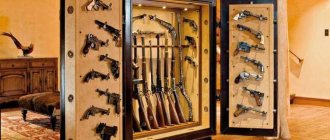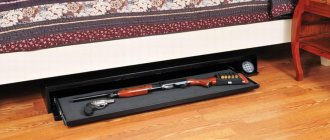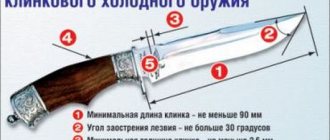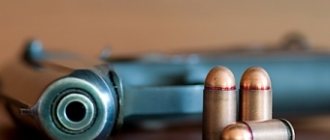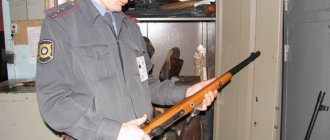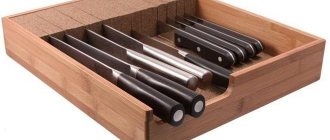Weapons are an item of increased danger, a product whose circulation in the country is strictly limited.
Improper use of weapons or violation of storage rules can lead to serious consequences. Not only do such actions result in criminal and administrative liability, but innocent people, including children, can suffer from weapons.
For whatever purpose a person owns a weapon: for hunting, personal self-defense or on duty, he is obliged to comply with the rules for storing hunting weapons and ammunition.
Rules for storing weapons
Purchasing a hunting weapon is not difficult, but a person will have to deal with paperwork. First of all, you need to obtain a license to purchase firearms. Doing this is quite problematic, so it is recommended that you first familiarize yourself with all the legislative nuances.
In addition to having a license to purchase a weapon, a hunter must also obtain permission to store it. This is another lengthy bureaucratic procedure that cannot be avoided.
Note! Possession of firearms without a permit may result in criminal prosecution.
To obtain permission to store hunting weapons at home, you need to contact the appropriate authority. This permit is offered to be purchased, but before this a person will have to undergo a lengthy check.
A medical examination is required. Mandatory doctors include a narcologist, an ophthalmologist, a psychiatrist, and a therapist. The medical examination is required to be completed at the clinic at your place of residence. Then the hunter is given a conclusion, on the basis of which a storage permit is issued.
The purpose of such a medical examination is to prove that the person is mentally healthy. Insane citizens should not keep firearms at home, otherwise it would lead to chaos.
You definitely need to visit a narcologist and undergo an examination. If a person has been diagnosed with dangerous addictions (including alcohol), which equates to mental illness, he cannot keep weapons. The fact is that no one can guarantee that a hunter in a state of alcoholic intoxication will not take out a gun to show off, and will not accidentally injure people around him.
It is also important to check with an ophthalmologist to rule out inattention and errors when handling weapons due to poor vision.
In general, a gun permit is necessary to protect civilians from the potential danger posed by someone who carelessly handles a firearm.
Firearms must be stored in special conditions that prevent children or unauthorized persons from gaining access to the dangerous item. In this regard, the hunter must understand that storing weapons is a responsibility, including a criminal one, which falls only on his shoulders.
Procedure for obtaining storage permission
A permit to store a weapon is issued on the basis of a license to purchase it. Like a license, a storage permit has a validity period of 5 years from the date of issue. After this period, the permit must be renewed.
Responsibility for violating the procedure for using weapons
Any violations of storing or carrying hunting or other types of weapons are strictly punished. Depending on the offense, both administrative and criminal liability may be applied.
Administrative responsibility
The Code of Administrative Offenses of the Russian Federation has several articles regulating the rules for handling weapons . Let's look at the most commonly used of them:
- Art. 20.8 – violation of the rules for storing, carrying and destroying weapons. For example, the lack of safes or alarms, carrying a pistol in your pocket, the presence of weapons at a rally, etc. Such behavior threatens with a fine of up to 2,000 rubles or deprivation of the right to store weapons for a year.
- Art. 20.9 – installation of a night vision or silent shooting sight on the weapon. Such tuning is fraught with fines of up to 2,500 rubles with confiscation of installed devices.
- Art. 20.11 – violation of deadlines for registering weapons. The fine for violation will be a maximum of 3,000 rubles. Sometimes you can get by with a warning.
- Art. 20.12 – violation of the rules for transporting weapons provides for a fine of up to 3,000 rubles and deprivation of the right to own weapons for up to 2 years.
- Art. 20.13 – shooting in undesignated areas. This is the same hunt in the wrong place. Responsibility will be applied in the form of a fine of up to 5,000 rubles with confiscation of weapons.
For carrying a weapon by a drunk person in 2022, a fine of up to 5,000 rubles will be imposed with confiscation of weapons and ammunition.
Criminal liability
In the Criminal Code of the Russian Federation, responsibility for the illegal acquisition and storage of weapons is enshrined in Art. 222 . According to the article, such actions are a crime and involve the following types of punishment:
- Restriction of freedom up to 3 years;
- Forced labor for up to 4 months;
- Arrest for six months;
- Imprisonment for up to 4 years.
Six years in prison can be received for committing a crime by prior conspiracy by a group of persons, and 8 years for an organized crime group.
If a criminal voluntarily surrenders illegally acquired weapons, he may be released from criminal liability.
Hunting weapons are a type of civilian weapon and have similar acquisition and storage rules as weapons for self-defense.
Current legislation strictly regulates the rules for storing any weapons that pose a danger to society.
When obtaining a weapons license, you need to understand the full responsibility of such ownership, the possible risks and be prepared to bear responsibility for violating established legal norms.
Rules for foreign citizens
Recently, hunting tourism has become increasingly popular in the Russian Federation. At the same time, foreign citizens import their personal firearms and hunting weapons into the country, and are often interested in the peculiarities of storing them on the territory of another state. The rules here are generally the same as for citizens of the Russian Federation.
The person will be required to provide a hunting license, the right to purchase a weapon, and relevant documents for the specific model of firearm. A foreigner may carry his own gun or hunting rifle exclusively within the hunting grounds, but independently transporting his own weapon to his destination is not prohibited; the restriction only applies to carrying it in populated areas.
To ensure safe storage, a person must have a special locking case that guarantees the safety of the weapon and protects against unauthorized access to the weapon by strangers.
Who is prohibited from storing?
A person may be denied a permit to possess a weapon in several cases:
- mental health disorders;
- lack of conditions for storing weapons;
- existence of fines for improper storage.
Thus, a permit may simply not be issued if there are doubts about a person’s mental health. In this case, the possession of firearms raises a number of questions; however, people with unstable mental health are usually not given a license to purchase such weapons.
Before issuing the corresponding document, the local police officer or inspector must check the presence of a special safe to ensure the safe storage of weapons by the hunter. If the safe, or the room in which it is installed, does not meet the standards, it will not be possible to obtain permission.
Requirements for the placement of hunting weapons
Basic rules for storing hunting weapons:
- weapons must be kept in a locked safe;
- ammunition should be kept separately;
- different types of weapons can only be stored separately and exclusively in disassembled condition;
- Storage of gunpowder is allowed only in separate cells of the safe, away from other ammunition.
To store hunting weapons and ammunition, you need a reliable safe equipped with separate cells. Separate storage is necessary to ensure that an unauthorized person cannot gain access to a weapon ready to fire. This is especially important for families with small children, as these rules serve as an additional guarantee that the child will not gain access to a dangerous toy.
Note! Possession of loaded weapons is strictly prohibited. Violation of this rule may result in a fine, confiscation of the weapon and the license to possess it.
The safe must be made of high-quality metal and equipped with a reliable lock.
Weapon storage room
Some hunters can boast of an impressive collection of firearms, which in the hands of an attacker becomes a serious threat to people's lives. To store several rifles or shotguns, you must allocate a separate room. Basic Rules:
- The storage cabinet should be located away from heating appliances;
- the cabinet must be locked with a key, the lock of the safe must be secure;
- there should be no flammable liquids or faulty equipment in the room;
- the premises must be protected from unauthorized entry through windows.
If a person has a large collection of firearms, special metal cabinets are used to store them. Such cabinets are equipped with many different cells for storing different parts of the weapon. Separately made boxes for ammunition and gunpowder.
Requirements for storing a large collection of hunting weapons include the need to install an alarm on the premises.
Additionally, you should take care of bars on the windows and a secure entrance door that will protect against unauthorized entry into the room. Of course, the cabinet for storing weapons is locked with a lock, the key to which must be kept only by the owner.
Correct installation of a safe for traumatic weapons
There are also rules for installing a safe for traumatic weapons. They provide for the possibility of opening by unauthorized persons, so they put forward simple requirements.
- Closed room;
- Fastening with bolts with a diameter of at least 6 mm; Detailed article about fastening the safe
- Reliable lock.
The most suitable place for a gun safe for a traumatic pistol is a completely closed room with a metal door on the ground floor. Law enforcement agencies will not find any violations by the owner.
The 2022 Russian requirements for a safe for traumatic weapons are described vaguely. Manufacturers have to play it safe so that owners of self-defense equipment do not face fines and community service.
Video, How to obtain a permit for traumatic weapons 2018?
- civilian self-defense weapons (pistol, revolver, firing device):
- civilian firearms without a barrel - PB-4 OSA, PB-2 "Aegis", MR-461 "Guard", "Cordon", MMRT-2 "Gadfly", MMRT-3 "Hornet-2", "Shaman", VPO- 501 "Leader"
- gas pistols and revolvers with the ability to fire rubber bullet cartridges (certified before July 1, 2011): Safegom, Reck Chief Special mod.60, Reck mod. Cobra, Kimar mod.85 Auto, Mauser HSc mod.90T, IZH-78-9T (and its modifications), IZH-79-9T “Makarych” (and its modifications), Iceberg GR-2071, Walther P22T, Walther P50T, Walther PP, Walther P99T, MP-341 “Hauda”, Tanfoglio INNA, T4 “Terminator”, Steel, Stalker, MP-355, TKB-0216T “Agent”, PM-T (released before 07/01/2011), etc.
- firearms of limited destruction (category introduced in 2011, some models that were already produced and on sale by 2011, as well as models developed after the law came into force, were certified): WASP R, MP-78-9T ( and its modifications), MP-79-9T "Makarych" (and its modifications), MP-353, all "Groza" pistols and revolvers, Streamer 1014 pistol (and its modifications), "Jorge", Shark, Crowbar - 13, Grand Power T10, Grand Power T12, Ratnik 410, PM-T (released before 07/01/2011)
- service firearms of limited destruction with cartridges of traumatic effect (MR-471, PST "Kapral", RS, Jorge S, Jorge-1S)
